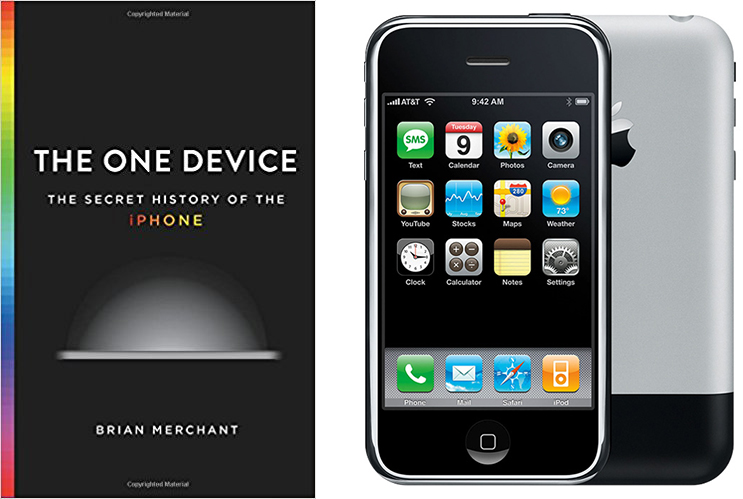'The One Device' Explores the Creation of the iPhone, the Technology That Went Into It, and MoreAs we
noted last week, today marks the release of
The One Device: The Secret History of the iPhone, a new book from Motherboard editor Brian Merchant chronicling the development of the original iPhone. I've had a chance to read through the book before its launch, and overall it's an entertaining read, although it comes up a bit short in its promise to unveil the secret history of the landmark device.
<img src="

" alt="" width="743" height="499" class="aligncenter size-full wp-image-570787" />
The One Device is really a book in two parts, and the part directly covering the development of the original iPhone is actually only about 30 percent of the book, broken up into four chapters interspersed throughout. The remainder of the book covers topics that are related to the iPhone, but which are in most cases separate from the direct early iPhone history.
In the four chapters that cover the development of the iPhone, Merchant weaves together his own interviews with a number of engineers who worked on the original iPhone with tidbits and quotes pulled from other sources such as executives' testimony in the Samsung trial, Walter Isaacson's
Steve Jobs, and Brett Schlender and Rick Tetzeli's
Becoming Steve Jobs. Many of the members of the original iPhone team have left Apple over the past ten years, so some of those key former employees including Bas Ording, Richard Williamson, Imran Chaudhri, and the colorful Andy Grignon were willing to talk to Merchant about their time working on the project.
There are some interesting details about early work on multi-touch inspired by Wayne Westerman's FingerWorks technology that was eventually acquired by Apple, Steve Jobs' obsession with secrecy on the project that led to the team winning an internal "innovation award" at Apple's annual "Top 100" retreat even though the project they working on couldn't be revealed to the those in attendance, and the trials and tribulations faced by the small initial team working under signifiant pressure.
"That project broke all of the rules of product management," a member of the original iPhone group recalls. "It was the all-star team — it was clear they were picking the top people out of the org. We were just going full force. None of us had built a phone before; we were figuring it out as we went along. It was the one time it felt like design and engineering were working together to solve these problems. We'd sit together and figure it out. It's the most influence over a product I've ever had or ever will have."
The "secret history" outlined in these chapters feels a bit on the light side, and it left me wishing Merchant could have dug into more detail on it. That's understandably a difficult task given Apple's penchant for secrecy that keeps many of those with direct knowledge off limits and others who were able to talk still limited in what they felt comfortable disclosing, but I was still hoping for a bit more.
The bulk of the book covers topics that are more ancillary to the iPhone's development, areas such as raw material mining in Bolivia and Chile, working conditions in Foxconn's Chinese facilities, and some of the additional history on multi-touch. Background on ARM processors, lithium-ion battery technology, and Corning's Gorilla Glass help to fill things out, while a fairly extensive interview with Tom Gruber, one of the founders of Siri, helps the reader understand where Apple's personal assistant came from.
Merchant spices up these chapters with his own first-hand experiences gained by traveling to many of the locations, offering not only vivid descriptions of the locations themselves but also in-person interviews with some of the innovators responsible for the technological leaps that eventually enabled the development of the iPhone.
Overall, the book reveals only a few new tidbits and insights on the actual creation of the iPhone, but it's still interesting to hear some of these details shared directly by those who were there. Combine those stories with the background chapters on many of the components and technologies that have made their way into the iPhone, and for those reasons alone
The One Device is a worthy read. It's a nice overview for those who may not be steeped in the history of Apple and its devices, but it left me wishing for more depth in the areas that mattered most.
The One Device: The Secret History of the iPhone launches today and is available from
Amazon, the iBooks Store [
Direct Link], and other retailers.
Discuss this article in our forums
<div class="feedflare">
<img src="[url]http://feeds.feedburner.com/~ff/MacRumors-Front?d=yIl2AUoC8zA" border="0"></img>[/url]
<img src="[url]http://feeds.feedburner.com/~ff/MacRumors-Front?d=6W8y8wAjSf4" border="0"></img>[/url]
<img src="[url]http://feeds.feedburner.com/~ff/MacRumors-Front?d=qj6IDK7rITs" border="0"></img>[/url]
</div><img src="
http://feeds.feedburner.com/~r/MacRumors-Front/~4/-oNIocTyymw" height="1" width="1" alt=""/>
Source:
'The One Device' Explores the Creation of the iPhone, the Technology That Went Into It, and More